Author: everbella
21 Questions About Collagen-Boosters — Answered
When it comes to glowing skin, shiny hair, and strong nails, collagen is just the beginning. To keep things going, it’s best to provide your body with a whole team of vitamins, minerals, and plant nutrients to protect and build the collagen you already have.
That’s why the EverBella team and I created Collagen NutraBoost Beauty Gummies—a tasty way to get not only collagen support, but also powerful beauty nutrients in one bite.
Below you’ll find the most common questions people ask—about collagen boosters in general, the star ingredients in NutraBoost, and the gummies themselves.
So, keep reading to know everything there is to know about just not collagen boosters, but NutraBoost Gummies as well!
Collagen Booster FAQs
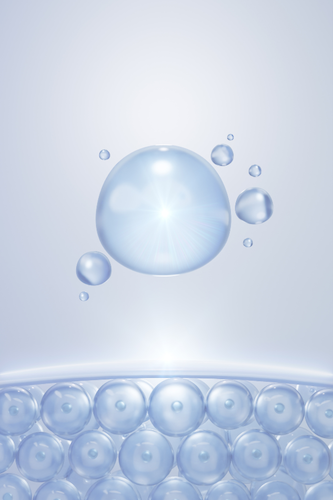
1. What do collagen boosters actually do?
They give your body the nutrients it needs to make and protect its own collagen. This means firmer, smoother skin, stronger hair and nails, and better joint support.
2. How do vitamins and antioxidants protect collagen?
Free radicals from pollution and sun can break down collagen. Antioxidants like vitamin C and grape seed extract act like a shield, slowing that damage so your skin stays firm longer.
3. Why do we lose collagen as we age?
Starting in our twenties, natural collagen production drops each year. Sun exposure, stress, smoking, and high sugar diets speed the process.
4. Can food alone give me all the collagen support I need?
Healthy foods like citrus, berries, and protein help, but many people still fall short. A supplement can fill the gaps and deliver steady, consistent support.
5. How long before I see results from beauty gummies?
Most people notice changes like stronger nails or extra hair shine in about 4–8 weeks. Deeper skin improvements often show up after two to three months.
6. Are beauty gummies safe to take every day?
Yes—when taken as directed. NutraBoost is vegan, gluten-free, soy-free, and made for daily use. If you have a medical condition, check with your doctor first.
7. Do I need both collagen and vitamin C?
Absolutely. Collagen is the building block; vitamin C is the spark that helps your body create it. They work hand in hand.
8. Can these nutrients help nails and joints too?
Yes. The same proteins and antioxidants that support skin also strengthen nails and help cushion joints.

9. What makes amla berries special?
Amla (Indian gooseberry) is packed with vitamin C and plant compounds that defend against UV damage and help fade dark spots, all while protecting existing collagen.
10. How does grape seed extract help?
It delivers powerful antioxidants that calm redness and protect collagen from oxidative stress, helping skin look even and fresh.
11. What is resveratrol from Japanese knotweed?
Resveratrol fights free-radical damage and helps keep skin’s elastin strong, so your complexion stays firm and youthful.
12. Why is bamboo leaf a big deal for hair and nails?
Bamboo is naturally rich in silica, which strengthens hair strands and nails while supporting the connective tissue that holds skin firm.
13. What do vitamins A and E do?
Vitamin A supports skin cell turnover for a healthy glow. Vitamin E helps skin stay hydrated and protects it from sun and pollution damage.
14. How does zinc support beauty from within?
Zinc calms inflammation and supports healing, helping skin stay clear and smooth while also giving your immune system a boost.
15. Why is biotin famous for hair and nail strength?
Biotin helps your body create keratin—the main protein in hair and nails—so they can grow stronger and thicker.
16. How does vitamin C directly boost collagen production?
Vitamin C is a key co-factor your body needs to actually build collagen fibers. Without enough, collagen can’t form properly.
17. How many gummies should I take daily?
Just two gummies a day gives you the full beauty-nutrient dose.
18. How much sugar is in a serving?
About 5 grams (roughly one teaspoon) per two-gummy serving—mostly from fruit-based ingredients.
19. Are they vegan and allergy-friendly?
Yes! They’re vegan, gelatin-free, gluten-free, and soy-free.
20. How long does one bottle last?
Each bottle has 60 gummies—enough for 30 days when you take two a day.
21. Is there a money-back guarantee?
Absolutely. You’re protected by EverBella’s 180-day refund policy.
The Takeaway
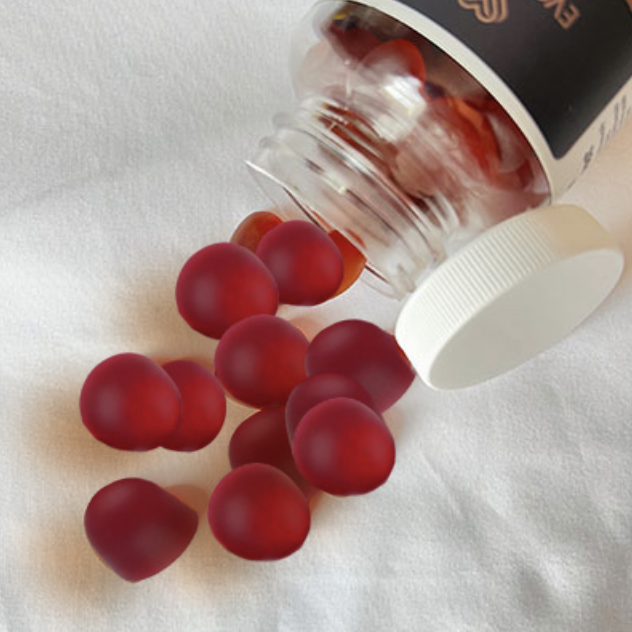
Great skin, hair, and nails aren’t about just one nutrient. They’re the result of a whole team working together.
EverBella Collagen NutraBoost Beauty Gummies combine collagen-supporting botanicals like amla, bamboo, and grape seed with key vitamins and minerals so your body can build—and protect—its own natural beauty from within.
With a delicious citrus blast flavor and a 180-day money-back guarantee, adding NutraBoost to your daily routine is an easy (and tasty) way to glow from the inside out.
>>> Ready to bring your beauty to the next level in the most delicious way possible? Tap this link!
21 Questions You Have About Collagen—Answered
Collagen has become one of the biggest buzzwords in beauty and wellness. But with all the hype comes a lot of questions.
What exactly is collagen? How does it work? And how can a supplement like EverBella Complete Collagen Plus help you look and feel your best?
When it comes to your health, I want you to be as informed as possible. That’s why I’ve pulled together the 21 most common questions—including ones about EverBella’s collagen—so you can get clear answers, all in one place.
Keep reading to learn everything you need to know about collagen!
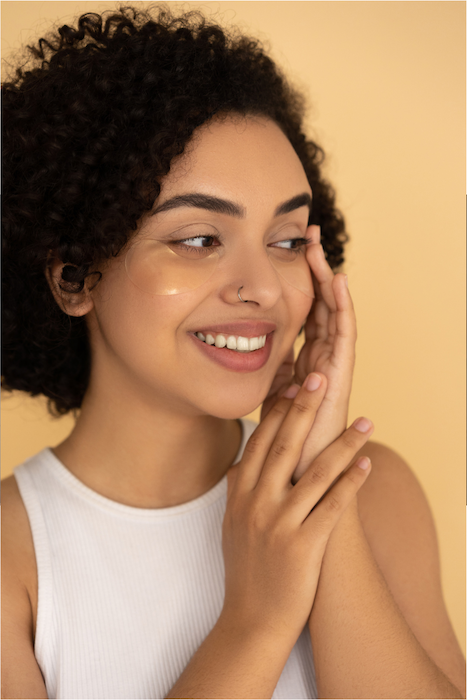
General Collagen FAQs
1. What is collagen and why is it important?
Collagen is the most abundant protein in your body. It’s like the “glue” that holds you together, keeping skin firm, hair strong, nails tough, and joints cushioned. Think of it as the scaffolding for your entire body.
2. Why do collagen levels drop as we age?
Starting in our 20s, we naturally make less collagen every year and your body struggles to repair collagen. Sun exposure, smoking, and a diet high in sugar can speed up the loss. Over time, less collagen means weaker support for skin and joints.
3. What are signs of low collagen?
Common signs include fine lines and wrinkles, sagging skin, brittle nails, slower wound healing, and stiff or achy joints.
4. Can I boost collagen with food?
Protein-rich foods like fish, chicken, and beans give your body the amino acids to make collagen. Vitamin C, zinc, and copper also help. Food helps, but it’s tough to replace what age takes away. So, many people add a supplement so they can be certain that they’re properly restoring lost collagen.
5. What types of collagen are there?
There are three main types. Type I supports skin, hair, nails, and bones. Type II cushions joints and cartilage. Type III helps with skin and blood vessels. Most supplements focus on types I and III for beauty and joint benefits.
6. Do collagen supplements really work?
Research on hydrolyzed collagen peptides shows real benefits: smoother skin, stronger nails, and better joint comfort after several weeks of use.
7. How long until I see results?
Most studies show visible changes in 4–12 weeks. Some people notice stronger nails or shinier hair even sooner. It depends mostly on your current levels.
8. Are collagen supplements safe?
For most healthy adults, yes. They’re generally well tolerated. And if they’re not, it’s typically not the collagen causing the issue, but other added ingredients in the formula. This is why it’s important to find a quality collagen supplement. If you have food allergies or a medical condition, check with your healthcare provider first.
9. When is the best time to take collagen?
Morning or night—it doesn’t matter. The key is taking it consistently each day.
10. Does collagen help joints and bones?
Yes. Studies show collagen can improve joint comfort and support bone density, making it popular with athletes and older adults.
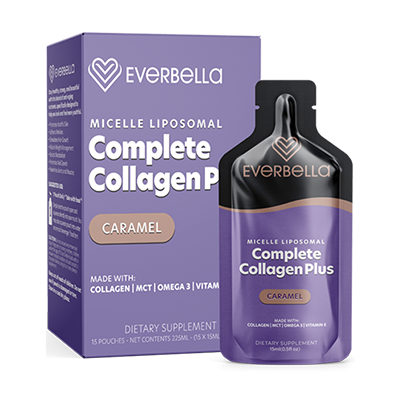
EverBella Complete Collagen Plus FAQs
Now that you know the basics, here’s what people ask about EverBella Complete Collagen Plus itself.
11. How often do I take it?
Just one of our perfectly-portioned pouches per day, after any meal—breakfast, lunch, or dinner.
12. How much collagen is in each serving?
Each tablespoon delivers 1,000 mg of collagen in an easy-to-take liquid.
13. How long does a box last?
One box has 15 pouches—enough for 15 days. I recommend two boxes for a full month’s supply.
14. Is there a money-back guarantee?
Yes! You have 180 days to try Complete Collagen Plus. You can get a refund—no questions asked—for ANY reason within that time.
15. Can it help with weight loss?
Many users notice moderate weight loss. The formula contains 3,000 mg of MCT oil, which can help stimulate ketosis and support a healthy metabolism.
16. What is the “natural caramel flavor”?
It comes from cocoa beans. The beans are cold-brewed, filtered, and the concentrated flavor is added during processing. Glycerin adds sweetness and whey protein balances the taste—giving you a smooth caramel flavor.
17. How is it sugar free?
Complete Collagen Plus uses organic coconut-derived glycerine as a natural sweetener. It tastes sweet but doesn’t spike blood sugar or add empty calories.
18. What makes it different from other collagen products?
This isn’t ordinary collagen. The micellized collagen is shown to be up to 800% more absorbable, so your body gets more of what you take. Plus, extra ingredients help boost energy, maintain a healthy weight, and support overall wellness.
19. How will I know it’s working?
Everyone is different, but you may notice stronger nails within two weeks. By the end of the first month, hair can look shinier and skin more radiant. Some people also notice a slight drop in weight and feel full for longer.
20. Does it work for men too?
Absolutely. Collagen supports healthy hair growth, faster recovery after workouts, a healthy metabolism, and clear skin—benefits men and women can both enjoy.
21. Does it have a “beefy” aftertaste like other collagens?
Not at all. The collagen is highly purified, so all you taste is that smooth, delicious caramel.
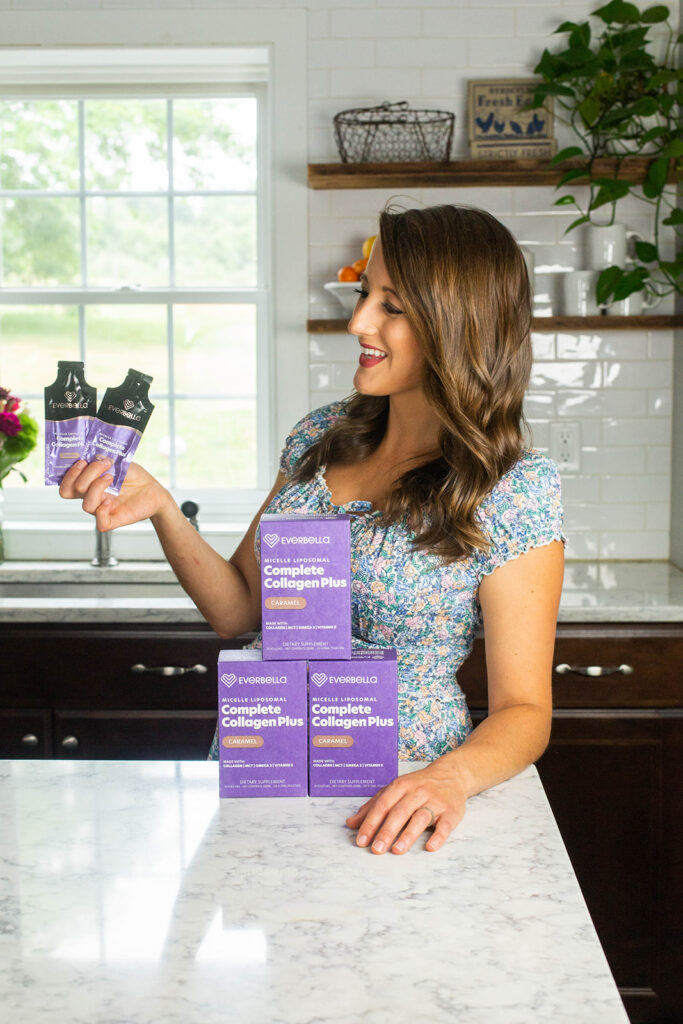
The Takeaway
Collagen is more than just a beauty buzzword. It’s a vital protein that supports your skin, hair, nails, and joints. But as we age, our natural supply drops.
EverBella Complete Collagen Plus gives you a tasty, highly absorbable way to keep your collagen levels steady—backed by a 180-day money-back guarantee.
Stronger nails, smoother skin, healthier hair, and more confident days are only a pouch away!
>>> Grab your collagen right here and save up to 25%!
Pumpkin Spice and Everything Nice: Fall Recipes With a Collagen Boost
There’s a crispness in the air, the leaves are turning golden, and suddenly pumpkin spice is everywhere. From lattes to candles to cookies, this cozy blend of cinnamon, nutmeg, and cloves has become the flavor of fall.
Some people wait all year for it, others roll their eyes at the craze — but love it or not, pumpkin spice season is here to stay.
And while it’s tempting to dive into every pumpkin-themed treat you see, most of the store-bought options are loaded with sugar, artificial flavors, and empty calories. That doesn’t mean you need to skip the fun. In fact, with a little creativity, you can enjoy your pumpkin spice favorites in ways that actually support your health and beauty.
The secret? Adding a nourishing twist with collagen.
Why Collagen Belongs in Your Fall Routine

Collagen is the most abundant protein in your body. It’s the scaffolding that keeps your skin smooth and firm, your hair strong and shiny, your nails resilient, and your joints flexible. But starting in your mid-20s, your body’s natural collagen production begins to slow. Add in environmental stress, sun exposure, and seasonal changes, and it’s no wonder so many people notice their skin looking duller and their joints feeling stiffer as the years go by.
Fall, in particular, can be tough on your beauty routine. The cooler, drier air tends to strip moisture from your skin and hair, leaving them prone to dryness, flakiness, and breakage. Collagen helps counteract these seasonal stressors by replenishing what your body is losing — keeping your glow going strong even as the days get shorter.
That’s where EverBella’s Complete Collagen Plus comes in. Unlike most collagen powders that don’t absorb well, Complete Collagen Plus uses micelle liposomal technology to deliver nutrients directly into your system so you actually feel and see the difference. And because it’s flavored with a rich, natural caramel, it blends seamlessly into seasonal recipes.
Which brings us to the fun part: pumpkin spice recipes that taste indulgent but secretly love your body back.
4 Cozy Fall Recipes With a Collagen Twist
1. Pumpkin Spice Collagen Latte
Why spend $7 on a sugar-loaded coffee shop drink when you can make a better, healthier version at home? This latte is creamy, cozy, and enhanced with Complete Collagen Plus for a beauty-boosting caramel kick.
Ingredients (serves 1):
- 1 cup unsweetened almond or oat milk
- 2 tablespoons pumpkin purée
- ½ teaspoon pumpkin pie spice (or mix cinnamon, nutmeg, ginger, and cloves)
- 1 teaspoon maple syrup (optional)
- ½ teaspoon vanilla extract
- 1 serving EverBella Complete Collagen Plus
Directions:
- Warm the milk in a small saucepan until steaming.
- Whisk in pumpkin purée, spices, maple syrup, and vanilla.
- Pour into a mug, stir in Complete Collagen Plus, and top with a sprinkle of cinnamon.
- Sip and enjoy knowing your morning pumpkin spice obsession is doubling as a beauty ritual.
2. Collagen-Infused Pumpkin Overnight Oats
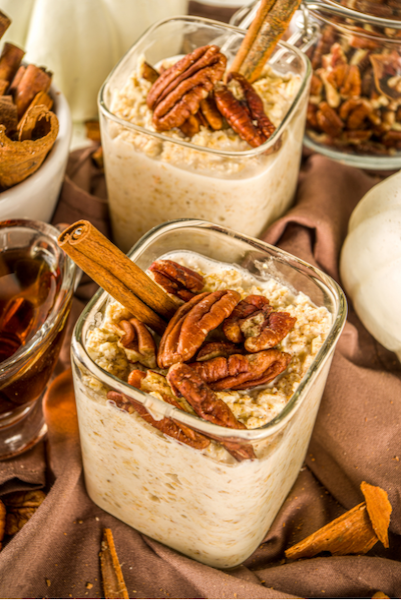
Start your day with a breakfast that’s equal parts cozy and nourishing. These overnight oats practically make themselves while you sleep and give you fiber, protein, and a collagen boost first thing in the morning.
Ingredients (serves 2):
- 1 cup rolled oats
- 1 cup unsweetened almond milk
- ½ cup pumpkin purée
- 2 tablespoons chia seeds
- 1 teaspoon cinnamon
- ¼ teaspoon nutmeg
- 1 tablespoon maple syrup (optional)
- 2 servings EverBella Complete Collagen Plus
Directions:
- In a mason jar or bowl, combine oats, almond milk, pumpkin purée, chia seeds, spices, and maple syrup. Stir well.
- Cover and refrigerate overnight.
- In the morning, stir in Complete Collagen Plus before serving.
- Top with chopped pecans or pumpkin seeds for crunch.
This hearty breakfast doesn’t just keep you full until lunch — it also supports your gut, skin, and joints while you’re on the go.
3. Autumn Glow Smoothie
Yes, smoothies are usually a summer thing, but this version brings all the warmth of fall into a frosty, nutrient-packed drink. Perfect for when you want something refreshing but still seasonal.
Ingredients (serves 1):
- 1 frozen banana
- ½ cup frozen cauliflower rice (trust me — you won’t taste it, but it adds creaminess + nutrients)
- ½ cup pumpkin purée
- 1 teaspoon cinnamon
- ½ teaspoon vanilla extract
- 1 cup unsweetened almond milk
- 1 serving EverBella Complete Collagen Plus
Directions:
- Add all ingredients to a blender and blend until smooth and creamy.
- Pour into a tall glass, sprinkle with extra cinnamon, and enjoy your “autumn glow in a glass.”
Not only is this smoothie loaded with fiber, vitamins, and antioxidants, but the collagen supports your skin’s natural radiance from the inside out.
4. Collagen Caramel Drizzle (Optional Treat)
Want to take your fall desserts to the next level? Try this collagen-infused caramel drizzle. It’s simple, indulgent, and makes even a plain baked apple feel like a gourmet treat.
Ingredients:
- 2 tablespoons almond butter or cashew butter
- 1 tablespoon warm water (to thin)
- 1 serving EverBella Complete Collagen Plus
Directions:
- Stir almond butter with warm water until smooth and pourable.
- Mix in Complete Collagen Plus.
- Drizzle over baked apples, pumpkin bread, or even a bowl of Greek yogurt.
It’s sweet, nutty, and secretly nourishing — a little reminder that dessert doesn’t have to be guilty to be delicious.
Making Pumpkin Spice Work for You
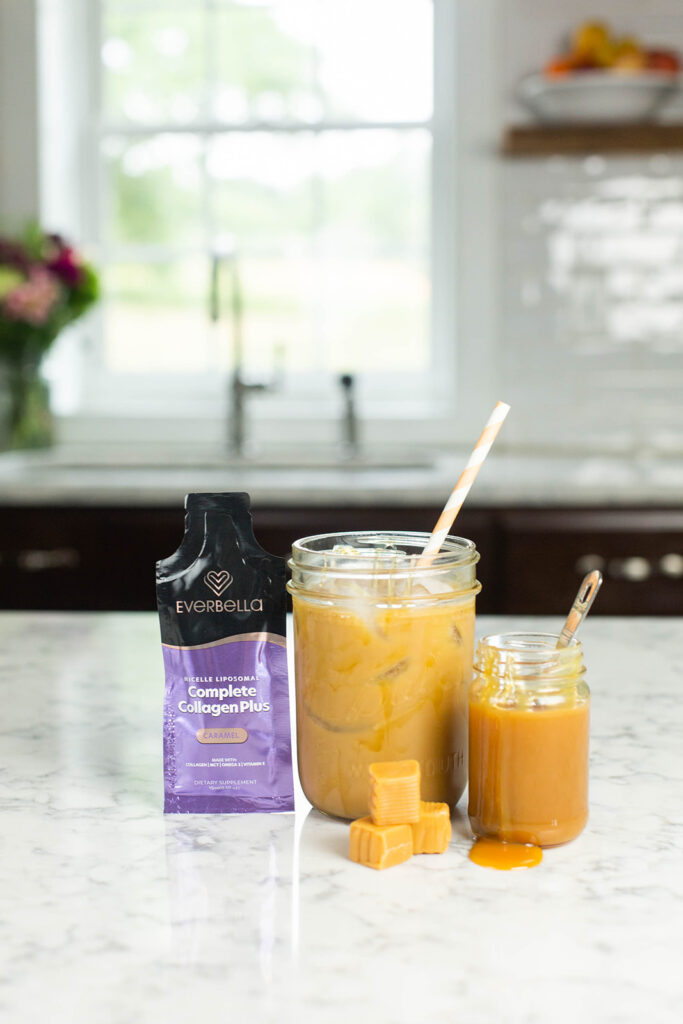
Pumpkin spice season doesn’t have to mean sugar crashes and empty calories. By making your own cozy recipes at home, you get all the flavor and comfort without the junk. Even better, when you stir in Complete Collagen Plus, those treats actually become an act of self-care — something that nourishes your body, your skin, and your confidence.
So go ahead, embrace the pumpkin spice craze. Wrap yourself in a blanket, light that fall candle, and sip a collagen-boosted latte while the leaves change outside. Your taste buds will love it. Your skin, hair, and joints will thank you. And your fall traditions will feel even more special knowing they’re supporting you from the inside out.
>>> Get Your Complete Collagen Plus For Fall Recipes Right Here
6 Reasons To Take a Daily Collagen Booster
When most people hear “collagen,” they think of smooth skin, shiny hair, and strong nails. And while that’s true — collagen is the body’s most abundant protein and the foundation of beauty from within — here’s what many don’t realize:
Your body doesn’t make enough collagen forever. By your mid-20s, natural production begins to slow… and each decade after, it declines even more.
That’s why so many of us start to notice the first signs of aging sooner than expected: fine lines, weaker nails, thinning hair, or skin that just doesn’t “bounce back” the way it used to.
And some people are even more at risk of collagen decline:
- Vegans and vegetarians who don’t get collagen from animal sources
- Busy adults whose stress and sugar intake speed up collagen breakdown
- Post-menopausal women, who lose collagen at an accelerated rate
- Anyone over 30 who wants to keep their youthful glow for as long as possible
Here’s the good news: you don’t just have to accept this loss. Adding a collagen booster to your daily routine can help your body make the most of the collagen it already has, protect it from damage, and support healthy new collagen production.
In this blog, we’ll share 6 research-backed reasons why a daily collagen booster may be your beauty routine’s missing piece — and how a simple, sugar-free gummy can help you look and feel your best.
1. Collagen Levels Naturally Decline With Age
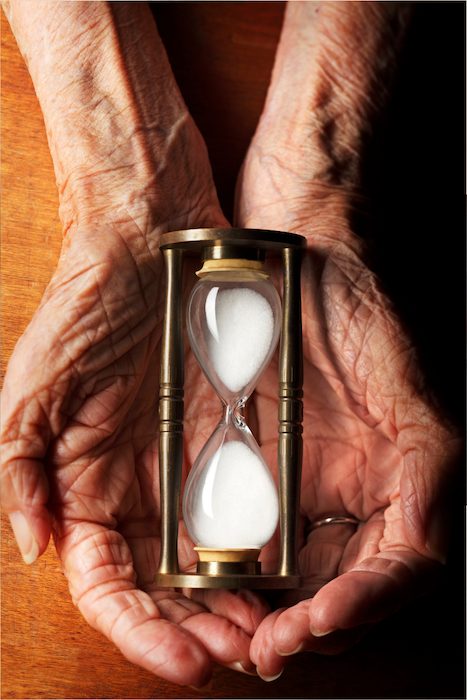
Collagen is what keeps your skin plump, your hair strong, and your nails resilient. But here’s the catch: your body makes less and less of it as you age.
In fact, research shows that starting in your mid-20s, collagen production drops by about 1% per year. That might not sound like much, but by the time you hit your 40s and 50s, that loss really adds up — and you can see it in the mirror. Fine lines deepen, skin feels thinner, and nails and hair don’t have the same strength they once did.
For women, the decline speeds up even more around menopause, with studies showing collagen loss can increase by up to 30% in the first five years after the transition.
This is why a collagen booster is so important: instead of only supplying collagen, it helps your body protect what you have and support healthy new production. That way, you can slow down the visible effects of this natural decline and give your skin, hair, and nails the tools they need to stay vibrant.
2. Boosters Do More Than Just Collagen Alone
Straight collagen supplements can be great — they provide amino acids (the raw building blocks) your body uses to make new collagen. But here’s the thing: collagen isn’t built in isolation.
Your body also needs specific vitamins, minerals, and antioxidants to actually activate the enzymes that turn those building blocks into strong, flexible collagen fibers. Without those cofactors, you’re giving your body bricks, but no cement to hold them together.
That’s where a collagen booster comes in. Boosters combine collagen-supporting nutrients — like vitamins, minerals, and plant extracts — that:
- Help your body produce new collagen proteins
- Protect existing collagen from breaking down
- Work in synergy to amplify visible results
So instead of just topping up your collagen, a booster gives your body the full toolkit it needs to support skin elasticity, hair thickness, and nail strength from multiple angles.
This is why many people notice faster, more noticeable changes when they add a booster to their routine. It’s not just fueling collagen — it’s optimizing how your body uses it.
3. They Protect Collagen From Breakdown
Making collagen is only half the battle — the other half is keeping it from breaking down too quickly.
Every day, your collagen is under attack from things like:
- UV rays from the sun
- Sugar in your diet (which causes “glycation,” making collagen stiff and brittle)
- Pollution and toxins that create free radicals
- Stress hormones like cortisol that speed up aging
Without protection, these factors can chew through your collagen faster than your body can replace it — leading to fine lines, sagging skin, weak nails, and thinner hair.
Collagen boosters help fight back. Many contain antioxidants and plant extracts that neutralize free radicals, soothe inflammation, and shield your existing collagen from damage.
That means you’re not just giving your body the tools to build more collagen — you’re also protecting the collagen you already have, helping it last longer and function better.
Think of it like building a strong house and also putting a roof over it — so it doesn’t get ruined by rain, wind, and sun.
4. Support Multiple Beauty Pathways at Once
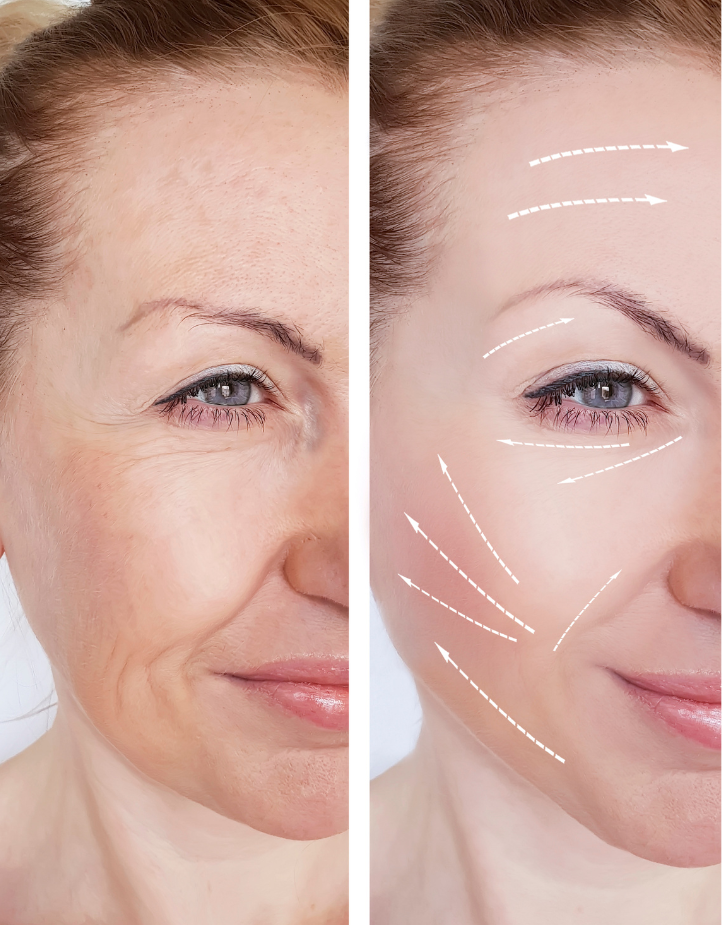
Collagen boosters don’t just stop at collagen. Many are designed to nourish your entire beauty system — meaning they give support to your skin, hair, and nails all at the same time.
For example, some nutrients found in boosters can:
- Hydrate skin from within, helping it look smoother and more elastic
- Strengthen hair follicles, supporting thicker, shinier strands
- Promote stronger nails, reducing brittleness and breakage
That’s what makes boosters such a smart addition to your daily routine — instead of focusing on just one piece of the beauty puzzle, they cover multiple bases at once.
So while collagen is working to keep your skin firm and youthful, other ingredients are backing it up by reducing damage, strengthening structure, and protecting against everyday wear and tear.
The result? You’re not only building collagen — you’re building a foundation for overall beauty and resilience.
5. Results Go Beyond Skin-Deep
When you think of collagen, you probably picture smoother skin or fewer fine lines. But the truth is, collagen plays a much bigger role in your body — and a booster can help you feel the difference in more ways than one.
Collagen is found not only in skin, hair, and nails, but also in your joints, muscles, and connective tissues. As levels decline, it’s not uncommon to notice:
- Stiffer joints after exercise or first thing in the morning
- Slower muscle recovery after activity
- Less energy or resilience overall
That’s why a daily collagen booster can feel like it works “from the inside out.” By supporting collagen production and protecting what you have, it doesn’t just enhance your outer beauty — it also helps maintain the structures that keep you moving, active, and comfortable.
The bonus? When your body feels good, it often shows in how you look — your skin glows brighter, your hair looks shinier, and your nails feel stronger.
So when we say collagen boosters go “beyond skin-deep,” we mean it literally. They support beauty and wellness in a way that a single-focus supplement often can’t.
6. NutraBoost: The Beauty Gummy That Makes It Easy
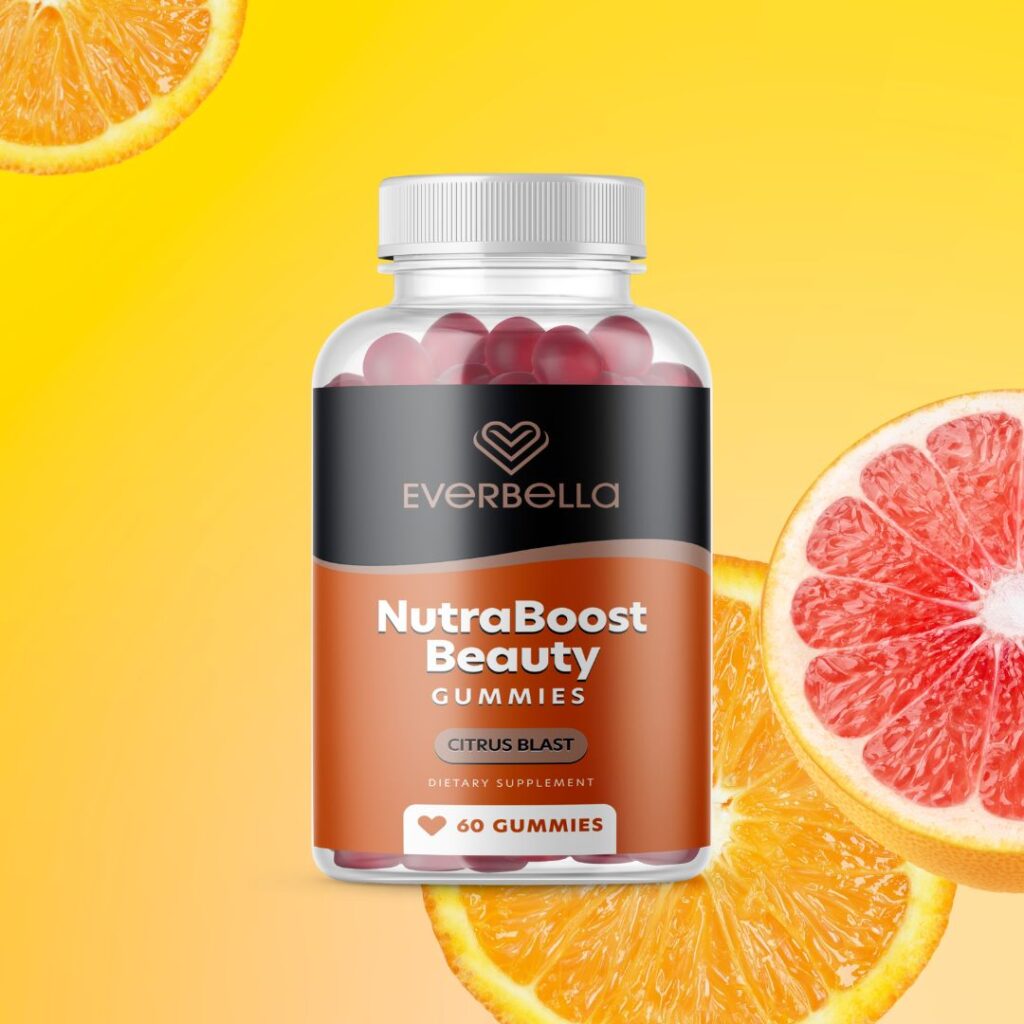
Of course, knowing why you need a collagen booster is one thing. Actually taking it every day is another. That’s where NutraBoost shines.
EverBella’s NutraBoost isn’t just effective — it’s fun, tasty, and simple. These sugar-free gummies are shaped like hearts and taste like a sweet little treat. So instead of dreading another capsule, you’ll actually look forward to taking them.
But don’t let the fun format fool you — inside each gummy is a carefully crafted blend of collagen-supporting, beauty-boosting nutrients. Together, they:
- Encourage your body’s natural collagen production
- Protect existing collagen from stress, sugar, and aging
- Support radiant skin, stronger hair, and tougher nails
That means you’re getting all the science-backed benefits of a booster — in a form you’ll never forget to take.
Your Daily Beauty Ritual, Upgraded
Collagen is the foundation of beauty from within. But as it naturally declines with age, a simple supplement isn’t always enough to keep you looking and feeling your best.
A daily collagen booster does more than replenish — it supports, protects, and amplifies your body’s ability to build its own collagen while also strengthening other beauty pathways.
And with NutraBoost, it couldn’t be easier (or tastier) to give your body that extra boost each day.
If you want smoother skin, stronger nails, shinier hair, and a beauty routine that feels effortless… NutraBoost just might be the missing piece you’ve been looking for.
6 Everyday Ingredients That Destroy Your Collagen (Backed by Science)
You’ve probably heard that sugar is bad for your skin. But did you know it can actually destroy collagen?
Collagen is the protein that keeps your skin firm, your joints flexible, and your hair strong. Think of it as the scaffolding that holds everything together. But just like rust eats away at metal, certain foods and drinks can chip away at your collagen stores.
And sugar isn’t the only culprit. In fact, there are several everyday ingredients — hiding in snacks, drinks, and even “healthy” foods — that speed up collagen breakdown and make it harder for your body to replace it.
Here are six of the biggest offenders, and the science behind how they do their damage.
1. Refined Sugar
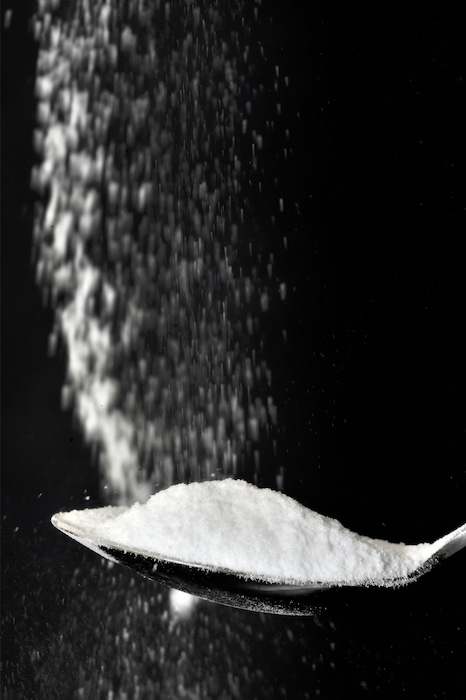
I’ll start with sugar.
When you eat too much sugar, it triggers something called glycation — a process where sugar molecules attach themselves to collagen fibers in your skin and connective tissue. This reaction makes those once-flexible fibers stiff, brittle, and far less capable of doing their job.
And this isn’t just a cosmetic concern. Glycation doesn’t only cause wrinkles — it can slow down your body’s ability to heal wounds, contribute to sagging skin, and even make your joints feel older and more achy than they actually are. Over time, the effects compound, leading to visible and structural signs of aging that are hard to reverse.
Research shows that glycation directly accelerates skin aging and collagen breakdown.
In fact, one study found that people with higher blood sugar levels showed significantly more skin aging signs — regardless of their actual age — because their collagen had become compromised. [1, 2]
Put simply: the more sugar you consume, the faster your collagen weakens. That’s why cutting back now can protect your skin’s firmness, your body’s mobility, and your youthful glow for years to come.
2. Processed Carbs (White Bread, Pasta, Pastries)
Even if you never sprinkle sugar on your food, eating processed carbs can have nearly the same collagen-damaging effect. That’s because refined carbohydrates — like white bread, pasta, pastries, crackers, and many breakfast cereals — are broken down into glucose so quickly that your body experiences a sharp spike in blood sugar.
This rapid rise in glucose fuels glycation, doing the exact same thing that just plain sugar does to your skin: making your collagen stiff and brittle. Over time, that damage leads to more wrinkles, less skin elasticity, and slower tissue repair.
To make matters worse, these refined foods are stripped of antioxidants, healthy fats, and protein — nutrients your body needs to protect and rebuild collagen. Without them, you’re not only accelerating collagen breakdown but also depriving your body of the tools to fix the damage. It’s a one-two punch that can age your skin faster and impact your joint and bone health too.
3. Vegetable & Seed Oils (Soy, Corn, Canola)
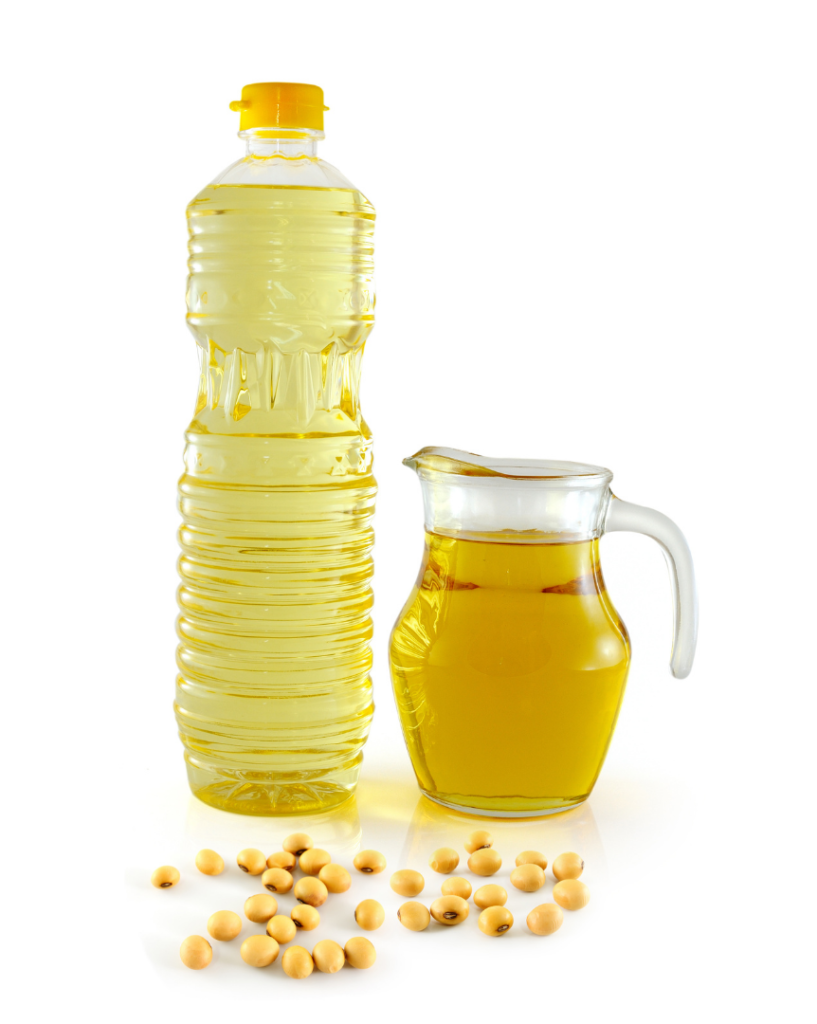
These oils are loaded with omega-6 fatty acids. While your body does require some omega-6 for proper function, too much can throw your fatty acid balance out of whack and spark a cascade of inflammation throughout your body — and inflammation is one of the most destructive forces against collagen. It breaks down existing collagen fibers, slows your body’s ability to produce new ones, and even interferes with the enzymes that help keep your skin smooth and firm.
A 2020 study found that diets high in omega-6 fatty acids didn’t just increase overall inflammation — they actually sped up visible signs of skin aging and triggered a faster loss of collagen in skin tissue. [3]
Over time, this can lead to more wrinkles, sagging, and a loss of skin elasticity, making you look older than you really are.
4. Alcohol
Alcohol dehydrates the skin, disrupts nutrient absorption, and fuels inflammation — all of which accelerate collagen breakdown.
When you drink, your body loses water, which leaves skin cells less plump and elastic. It also interferes with your ability to absorb vitamin C, one of the most essential nutrients for collagen production and repair. Without enough vitamin C, your body can’t efficiently create strong, healthy collagen fibers.
In addition, alcohol increases oxidative stress and chronic inflammation, both of which weaken the structural proteins in your skin over time.
This combination of dehydration, nutrient depletion, and inflammation gradually leads to thinner, weaker collagen fibers and slows the skin’s natural repair process — making fine lines and sagging appear sooner.
One study found that alcohol damages fibroblasts as well — the specialized cells responsible for producing collagen. When fibroblasts are impaired, collagen production slows dramatically, and the collagen that is formed tends to be less organized and more fragile. [4]
Over time, this damages compounds, resulting in skin that is less firm, less resilient, and more prone to premature aging.
5. Excess Caffeine
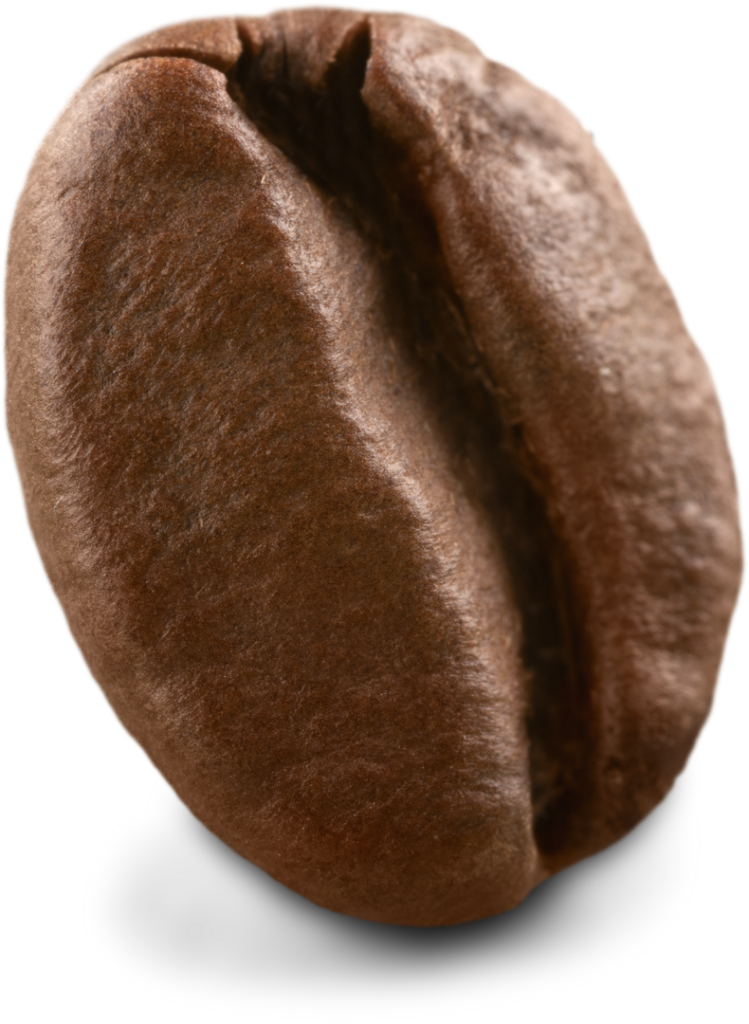
Moderate coffee consumption is perfectly fine — and in fact, coffee is packed with antioxidants that can help combat free radicals, which is good news for your skin.
However, when caffeine intake climbs too high, it can start to work against you. Excessive caffeine has a mild diuretic effect, which can lead to dehydration in your skin cells. This lack of hydration can make skin look dull, less plump, and more prone to fine lines.
On top of that, research suggests that too much caffeine may interfere with your body’s ability to produce collagen — especially if your diet and hydration levels aren’t providing the right balance of vitamins, minerals, and water to support collagen synthesis. [5]
Without these key nutrients, your skin’s natural repair and renewal processes can slow down, leaving you more vulnerable to signs of aging.
The bottom line: enjoy your daily cup (or two), but make sure you’re countering it with plenty of water and a nutrient-rich diet to keep your collagen production running smoothly.
6. Artificial Sweeteners
They may be sugar-free, but artificial sweeteners can throw your gut health out of balance — and your gut is one of the most important systems for keeping collagen production strong.
A healthy gut microbiome helps regulate inflammation, ensures your body can break down food effectively, and maximizes the absorption of collagen-building nutrients like vitamin C, zinc, and amino acids.
When artificial sweeteners disrupt that delicate gut environment, it can lead to inflammation and nutrient absorption problems.
Over time, this means your body has fewer of the raw materials it needs to repair and produce collagen, leaving your skin, joints, and connective tissues more vulnerable to the effects of aging. Even if you’re getting enough collagen in your diet, your body may not be able to fully use it if your gut health is compromised.
The Bottom Line

You can’t avoid every collagen-damaging food, but you can replenish your collagen daily to help stay ahead of the damage.
That’s where Complete Collagen Plus comes in.
➡️ Sugar-free and gut-friendly
➡️ Delivered via micelle liposomal technology for up to 800% better absorption
➡️ Includes collagen peptides plus MCTs, omega-3s, and vitamin E to support skin, hair, nail, and joint health
Think of it as your “daily armor” against collagen loss.
See how Complete Collagen Plus works here »
5 Nutrients Your Hair Follicles Crave (And 5 Things That Hurt Them)
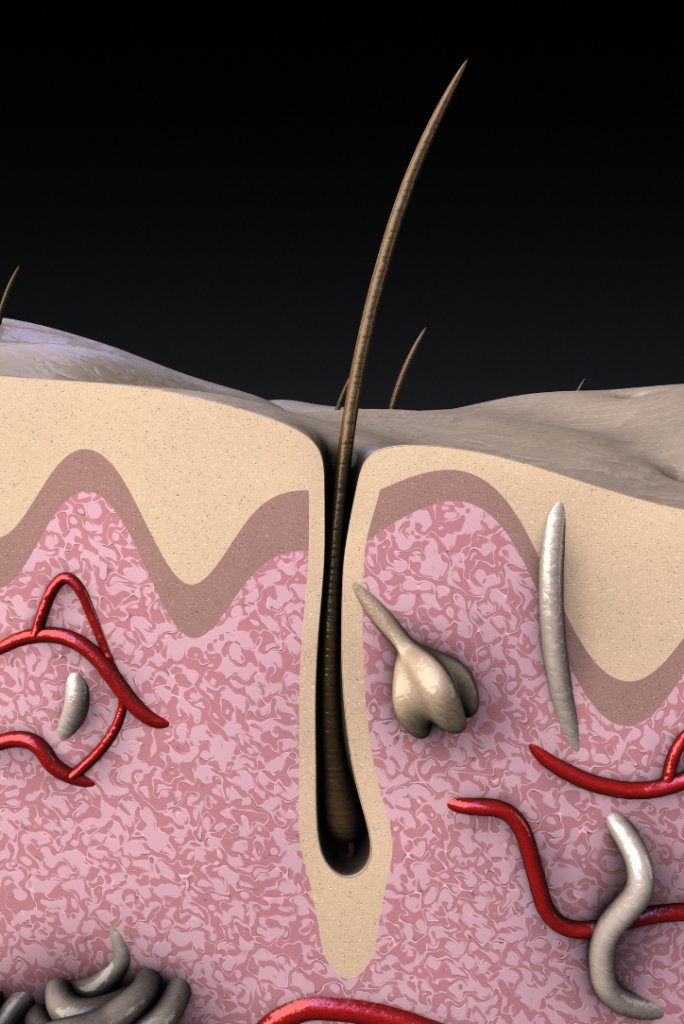
Your hair isn’t just about what’s on the surface, it starts deep at the root. Literally.
At the base of every strand is a tiny powerhouse called a hair follicle, and if it’s not getting the right support, your hair can quickly become thin, dry, brittle… or just stop growing altogether.
The truth is, your follicles are constantly cycling through phases of rest, shedding, and growth. But to stay in the growth phase and produce thick, vibrant hair, they need fuel — a.k.a. the right nutrients, delivered in the right form.
Unfortunately, most people don’t realize how many everyday habits, stressors, and nutrient gaps are working against their hair growth goals.
That’s why in this post, we’re breaking down:
- 5 nutrients your hair follicles crave
- 5 things that could be sabotaging them
…along with an easy, science-backed way to give your follicles the nourishment they need.
Let’s get into it.
5 Nutrients Your Hair Follicles Crave
Your hair follicles are tiny powerhouses, and just like any hardworking part of your body, they need fuel. The right nutrients don’t just support healthy hair growth… they trigger it. They energize your scalp, strengthen the roots, and signal your body that it’s time to grow thicker, shinier, more resilient hair. Below are five of the most important nutrients your follicles crave and what happens when they actually get them.
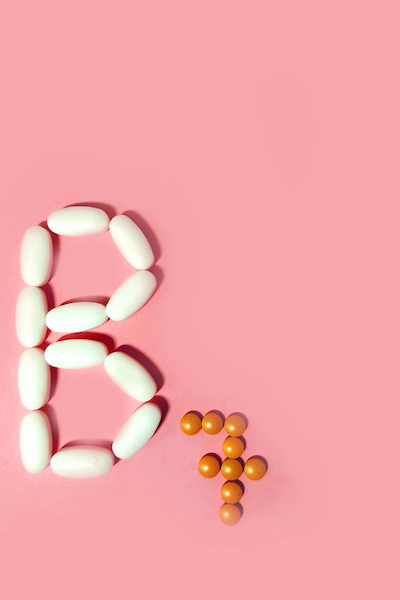
1. Biotin — The Foundation of Healthy Hair
Biotin (aka vitamin B7) is one of the most famous nutrients when it comes to hair — and for good reason.
Your hair is made of a protein called keratin, and biotin is essential for producing it. Without enough biotin, your hair follicles struggle to generate strong, healthy strands — leading to dullness, breakage, and thinning.
But here’s the kicker: your body doesn’t make or store biotin. That means if you’re not actively getting enough from your diet or supplements, your follicles may already be starving for it.
Bonus: Biotin also supports energy metabolism, brain health, and immune function — all things that contribute to your overall vibrance and appearance.
2. Vitamin D3 — Your Follicle’s Growth Signal
Vitamin D3 is like the “on switch” for your hair follicles.
When your levels drop (which can happen due to stress, menopause, postpartum, or not enough sun), your follicles can get “stuck” in the resting phase — the part of the cycle where they stop producing new hairs.
That means the hairs you naturally shed each day aren’t being replaced… and over time, those thin patches and bald spots start to appear.
Keeping your D3 levels high helps reset the growth cycle, giving your follicles the signal they need to get back to work.
3. Pumpkin Seed Oil — The Shine Booster
Pumpkin seed oil is rich in omega fatty acids, antioxidants, and zinc, all of which are amazing for your hair.
Not only can it promote hair growth, but it also helps keep strands strong, shiny, and resilient. It’s particularly helpful for women experiencing hair changes due to hormonal shifts (like menopause).
And unlike some hair oils that just sit on your scalp, this one works from the inside out to nourish follicles and keep the hair you do grow looking its best.
4. Cumin Seed Oil — The Breakage Defender
Used for centuries in traditional medicine, cumin seed oil (from nigella sativa) is a secret weapon against hair fall.
It helps reduce inflammation, strengthens hair at the root, and prevents breakage, so your hair can actually retain the length it’s growing.
In other words — it’s not just about growing more hair. It’s about keeping the hair you have!

5. Selenium — The Scalp Soother & Growth Supporter
Healthy hair starts with a healthy scalp and selenium makes that happen.
This trace mineral helps keep the scalp clear of flakes and irritation by reducing fungal buildup (like dandruff), which is often overlooked but essential for good hair growth.
What’s more, researchers have found that new hair shafts actually pull selenium from the bloodstream during early growth stages, suggesting that it plays a vital role in helping each strand get off to a strong start.
5 Things That Hurt Your Hair Follicles
But even if you’re feeding your follicles the right nutrients, they can only do so much if they’re being sabotaged from the inside or out. Stress, harsh products, and even everyday habits can quietly disrupt your hair’s natural growth cycle. If you want to protect your progress — and stop shedding in its tracks — here are five sneaky follicle foes you’ll want to avoid.
1. Hormonal Imbalance
Hormones play a massive role in the health of your hair. When they’re out of whack — especially during times like menopause, postpartum, or high stress — your follicles often suffer.
Estrogen, in particular, helps keep follicles in the growth phase. When levels dip, it can cause your hair to thin, fall out, or stop growing altogether.
Addressing hormone health (through nutrients like vitamin D3 or adaptogens) is often key to reversing this.
2. Nutrient Deficiencies
Hair isn’t a life-sustaining organ. So when your body lacks essential nutrients, it diverts them to more important areas — leaving your follicles starving.
Deficiencies in biotin, vitamin D, zinc, selenium, and B vitamins can all lead to brittle, thinning, or slow-growing hair.
Even if you’re eating well, modern soil depletion and absorption issues mean many people still aren’t getting enough of these hair-boosting nutrients. For that reason, it’s best to supplement. That way, you know you’re getting enough.
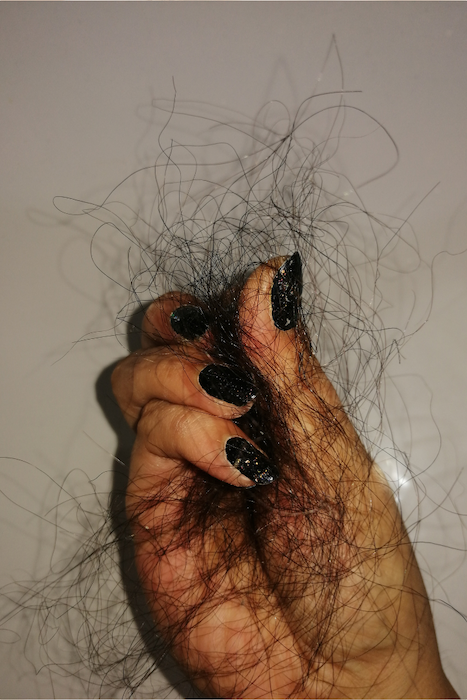
3. Chronic Stress
Stress isn’t just a feeling. It’s a chemical state that causes inflammation and hormonal shifts throughout your body.
When stress lingers, it can push hair follicles into the “telogen” phase — where they rest and eventually shed.
You may not notice it right away, but about 2–3 months after a stressful period, many people see sudden hair loss or thinning. That’s why managing stress is essential for long-term hair health.
4. Harsh Hair Products & Styling
Heat tools, bleach, tight hairstyles, and chemical-laden shampoos can all damage the shaft of your hair, but they also affect the follicle underneath.
If follicles are repeatedly irritated or inflamed, they can shrink or even go dormant, reducing your overall hair density.
While styling is fun and often necessary, it’s important to support your hair from within so it can bounce back stronger and healthier.
5. Blood Sugar Spikes
This one surprises a lot of people, but frequent blood sugar spikes from too much sugar or refined carbs can damage your hair follicles.
High blood sugar increases inflammation and oxidative stress, which may disrupt the hair cycle and contribute to thinning or loss.
That’s one reason why sugar-free supplements (like Complete Biotin Plus!) are such a smart choice for hair health.
Your Hair Deserves Nourishment — Inside and Out
If your hair hasn’t felt like “you” lately — whether it’s thinning, shedding, breaking, or just lacking that healthy shine — you’re not alone.
Our hair follicles are incredibly responsive to the world around (and inside) us. From nutrients to stress to hormone shifts, they’re constantly adjusting. The good news? With the right care, they can bounce back.
By avoiding the things that harm your follicles — and feeding them what they crave — you give your body the tools it needs to naturally grow stronger, fuller, and more beautiful hair.
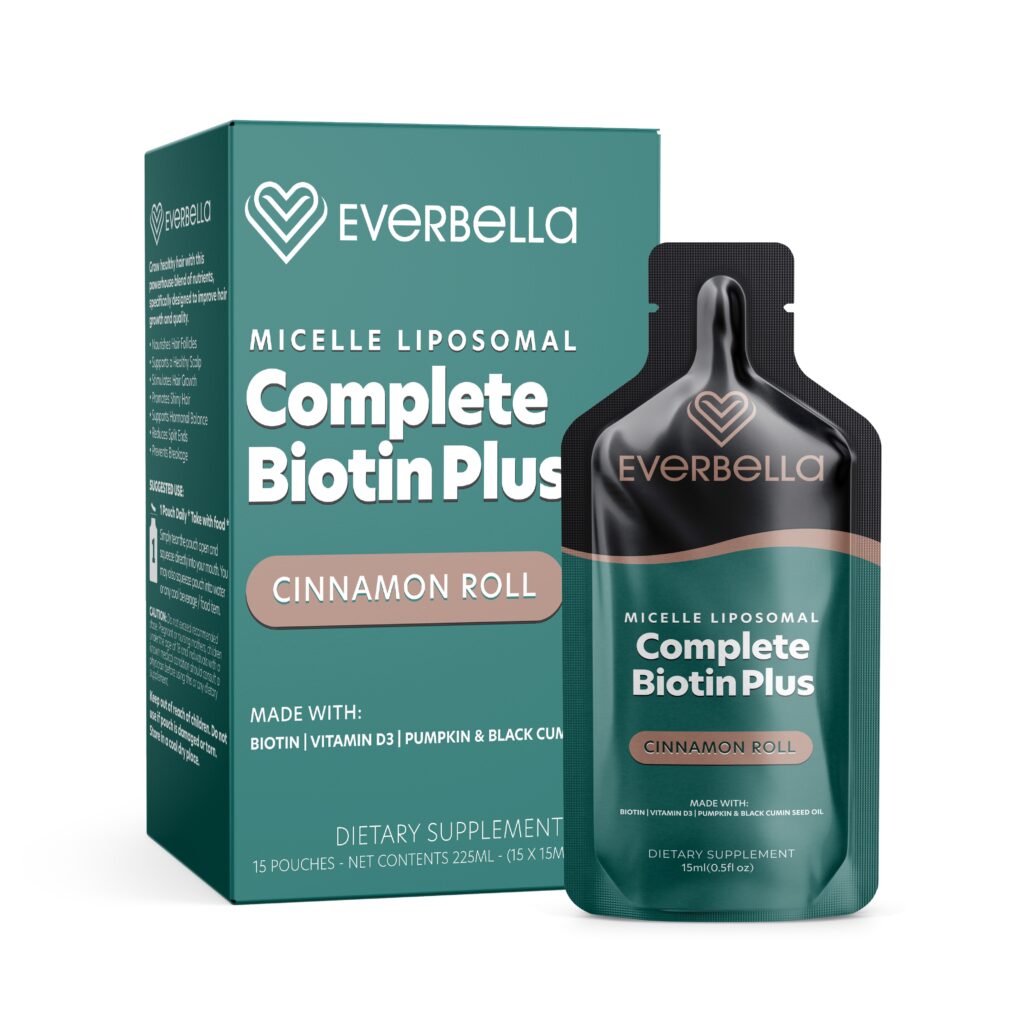
That’s exactly what Complete Biotin Plus was made for.
This sugar-free, cinnamon-flavored liquid formula is packed with hair-loving nutrients like biotin, vitamin D3, pumpkin and cumin seed oils, and selenium — all in a micelle liposomal form for maximum absorption.
Complete Collagen Plus an inside-out approach to beauty that makes supporting your hair (and your health) a daily treat.
Because you deserve to feel confident when you look in the mirror.
And your follicles? They’re ready when you are.
>>> Tap here and start giving your hair follicles what they crave EVERY single day
